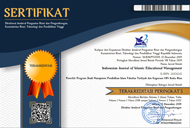Pendidikan dan Teknologi: Tantangan Dan Kesempatan
Abstract
Penggunaan teknologi dalam proses belajar dan mengajar merupakan suatu kebutuhan saat ini, karena teknologi dapat memperluas dan mengembangkan pembelajaran peserta didik, serta mendukung tujuan pengajaran. Selain itu, menggunakan teknologi memiliki dampak yang signifikan pada aplikasi pendidikan, dan mengubah cara guru mengajar, cara siswa belajar, dan cara guru dan siswa berkomunikasi. Namun, ini bisa menjadi tantangan nyata bagi para pendidik untuk menguasai berbagai alat teknologi, agar pendidik dapat memahami dan menyampakan pembelajaran dengan baik, dan tidak salah dalam memahami siswa. Revolusi industri 4.0 telah merubah sistem pengajaran, mindset, dan tindakan peserta didik dalam pengembangan ide-ide kreatif dan inovatif dalam berbagai permasalahan, maka revolusi dalam pendidikan harus dilakukan. Sehingga tenaga pendidik tidak hanya sebatas mentransfer pengetahuan, tapi juga berkewajiban mentransfer nilai, baik nilai agama maupun nilai moral, supaya tercipta generasi yang berkarakter dan berbudi luhur. Tujuan penelitian ini adalah untuk menguraikan tantangan dan kesempatan dalam revolusi pendidikan 4.0. Penelitian ini menggunakan metode studi pustaka (library research).
Kata Kunc: Pendidikan, Teknologi, Revolusi Pendidikan 4.0, Digital LearningFull Text:
PDFReferences
Ali, S. (2017). Educational Technology as a Key to Unlocking the Fourth Industrial Revolution-Malaysian Higher Learning Perspectives. Kuala Lumpur: Soaring Upwards.
Barlow, M.L. (2018). History of industrial education in the United States. Illinois: Chas.
Budiman, H. (2017). Peran Teknologi Informasi dan Komunikasi dalam Pendidikan. Jurnal Al-Tadzkiyyah: Jurnal Pendidikan Islam. Vol. 8, No. 4, hlm 82.
Chai., & Chain. (2016). Professional Learning For 21st Century Education. Journal Computer Education, Vol. 4, No. 4, hlm. 1-4.
Dabbagh, N., & Reo, R. (2018). Back to the future: Tracing the roots and learning affordances of social software. In M.J.W. Lee and C. McLoughlin (eds.), Web 2.0-based e-Learning: Applying Social Informatics for Tertiary Teaching. Hershey, Pa.: IGI Global.
Fomunyam, K. G. (2019). Education And The Fourth Industrial Revolution : Challenges And Possibilities For Engineering Education. International Journal of Mechanical Engineering and Technology (IJMET), Vol. 10, No. 08, hlm 23-25.
Grant, P., & Basye, D. (2014). Personalized learning: A guide for engaging students with technology. Eugene, Oregon, Washington, DC: International Society for Technology in Education.
Gordon, R.J. (2016). The Rise and Fall of American Growth: The U.S. Standard of Livingsince the Civil War. NJ, USA: Princeton University Press: Princeton.
Guilford, J. P. (1985). The structure-of-intellect model. In B. B. Wolman (Ed.), Handbook of intelligence: Theories, measure- ments, and applications. New York: Wiley.
Halili, S. H. (2019). Technological Advancements In Education 4.0. The Online Journal of Distance Education and e-Learning, Vol.7, No. 1, hlm. 15-17.
Hockly, N. (2012). Substitute or redefine? Modern English Teacher. International Journal of e-Education, Vol. 21, No. 3, hlm. 40-42.
Hussin, A. A. (2018). Education 4.0 Made Simple: Ideas For Teaching. International Journal of Education & Literacy Studies, Vol. 6, No. 3, hlm. 24-27.
Im, I., Hong, S., & Kang, M. S. (2011). An international comparison of technology adoption testing the UTAUT model. Journal Information & Management, Vol 48, No. 1, hlm. 1-8.
Jude, L. T., Kajura, M. A., & Birevu, M. P. (2014). Adoption of the SAMR model to assess ict pedagogical adoption: A case of Makerere University. International Journal of e-Education, e-Business, eManagement and e-Learning, Vol 4, No. 2, hlm. 106-115.
Kaklamanou, D., Pearce, J., & Nelson, M. (2012). Food and Academies: A Qualitative Study. Journal for Education, Vol 4, No. 2. Hlm. 1-23.
Keane, D. T. (2012). Leading with Technology. Journal of the Australian Council for Educational Leaders, Vol. 34, No. 2, hlm. 44-48.
Kohlberg, L. (2005). Tahap-tahap Perkembangan Moral. Yogyakarta: Kanisius.
Kirschenbaum, D.S., & Tomarken A. J. (1982). On facing the generalization problem The study of self-regulatory failure. In E C. Kendall (Ed.), Advances in cognitive-behavioral research and therapy. New York: Academic Press.
Lee, M., Yun, J.J., & Pyka, A. (2018). How to Respond to the Fourth Industrial Revolution,or the Second Information Technology Revolution? Dynamic New Combinations betweenTechnology, Market, and Society through Open Innovation. Journal of Open Innovation: Technology, Market and Complexity, Vol 4, No. 2. Hlm. 5-9.
Lin, M. H., Chen, H. C., & Liu, K. S. (2017). A Study of the Effects of Digital Learning on Learning Motivation and Learning Outcome. Journal of Mathematics Science and Technology Education. Vol 4, No. 2, hlm. 36-39.
McGuire., & Ismail, A. (2015). 21st Century Standards and Curriculum: Current Research and Practice. Journal of Education and Practice, Vol. 6, No. 5, hlm. 150 -154.
McKiernan, G. (2011). Configuring the ‘Future Textbook’. International Journal of Education,, Vol. 19, No. 4, hlm. 43-47.
Miyoshi, M., & Kasaoka, N. T. (2012). School-based “Shokuiku” program in Japan: Application to nutrition education in Asian countries. Asia Pacific Journal of Clinical Nutrition, Vol. 21, No. 1, hlm. 159-162.
Muhasim. (2017). Pengaruh Tehnologi Digital Terhadap Motivasi Belajar Peserta Didik. Jurnal Studi Keislaman dan Ilmu Pendidikan. Vol. 5, No. 2, hlm. 34-37.
Nawzad, L., Rahim, D., & Wakil, K. (2018). The Effectiveness of Technology for Improving the Teaching of Natural Science Subjects. Ijcets Journal. Vol. 4, No. 2, hlm. 15-21.
Peters, M. A. (2017). Technological Unemployment: Educating for the Fourth IndustrialRevolution. Journal of Self-Governance and Management Economics, Vol 5, No. 1, hlm. 25-33.
Price, L., & Kirkwood, A. (2014). Informed design of educational technology for teaching and learning? Towards an evidence-informed model of good practice. Journal Technology, Pedagogy and Education, Vol. 23, No. 3, hlm. 325-347.
Sebastian, D., Ali, S., Ivo, B., Jan, M. L., & Helmut, K. (2012). Determinants of physicians’ technology acceptance for e-health in ambulatory care. International Journal of Medical Informatics, Vol 81, No. 11, hlm. 746-760.
Shahroom, A, A., & Hussin, N. (2018). Industrial Revolution 4.0 and Education. International Journal of Academic Research in Business and Social Sciences, Vol. 8, No. 9, hlm. 78-88.
Shin, D. H., Shin, Y. J., Choo, H., & Beom, K. (2011). Smartphones as smart pedagogical tools: Implications for smartphones as u-learning devices. Journal Computers in Human Behavior, Vol. 27, No. 6, hlm. 27-31.
Sinclair, P. (2014). Basics in Education Textbook for B. Ed. Course. New Delhi: National Council of Educational Research and Training.
Sun, J. Y., Han, S. H., & Huang, W. (2012). The roles of intrinsic motivators and extrinsic motivators in promoting e-learning in the workplace: A case from South Korea. Journal Computers in Human Behavior, Vol. 28, No. 3, hlm. 94-95.
Volti, R. (2009). Society and Technological Change, 7th ed. New York: Worth Publishers.
Wahyuni, D. (2018). Peningkatan Kompetensi Guru Menuju Era Revolusi Industri 4.0. Kajian Singkat Terhadap Isu Aktual Dan Strategis. Vol. 10, No. 24, hlm. 25-27.
WEF (World Economic Forum). (2017). Realizing Human Potential in the Fourth Industrial Revolution An Agenda for Leaders to Shape the Future of Education, Gender and Work.White Paper, Geneva: World Economic Forum.
Yien, J. M., Hung, C. M., Hwang, G. J., & Lin, Y. C. (2011). A game-based learning approach to improving students’ learning achievements in a nutrition course. Turkish Online Journal of Educational Technology, Vol. 10, No. 2, hlm. 1-10.
Yoon, J., Kwon, S., & Shim, J. E. (2012). Present Status and Issues of School Nutrition Programs in Korea. Asia Pacific Journal of Clinical Nutrition, Vol. 21, No. 1, hlm. 128-133.
Yusnaini., & Slamet. (2019). Era Revolusi Industri 4.0: Tantangan Dan Peluang Dalam Upaya Meningkatkan Literasi Pendidikan. Prosiding Seminar Nasional Pendidikan Program Pascasarjana Universitas PGRI Palembang.
Zed, M. (2003). Metode Penelitian Kepustakaan. Jakarta : Yayasan Obor Indonesia.
DOI: http://dx.doi.org/10.24014/ijiem.v3i1.9095
Refbacks
- There are currently no refbacks.
Copyright (c) 2020 Indonesian Journal of Islamic Educational Management
INDEXED BY:
Mailing Address:
Gedung PMU Lt. II Fakultas Tarbiyah dan Keguruan Universitas Islam Negeri Sultan Syarif Kasim Riau
Jl. H.R. Soebrantas Km. 15 No. 155, Pekanbaru - Riau 28293, Email: ijiem.mpi@uin-suska.ac.id

IJIEM is licensed under a Creative Commons Attribution 4.0 International License.



.jpg)



